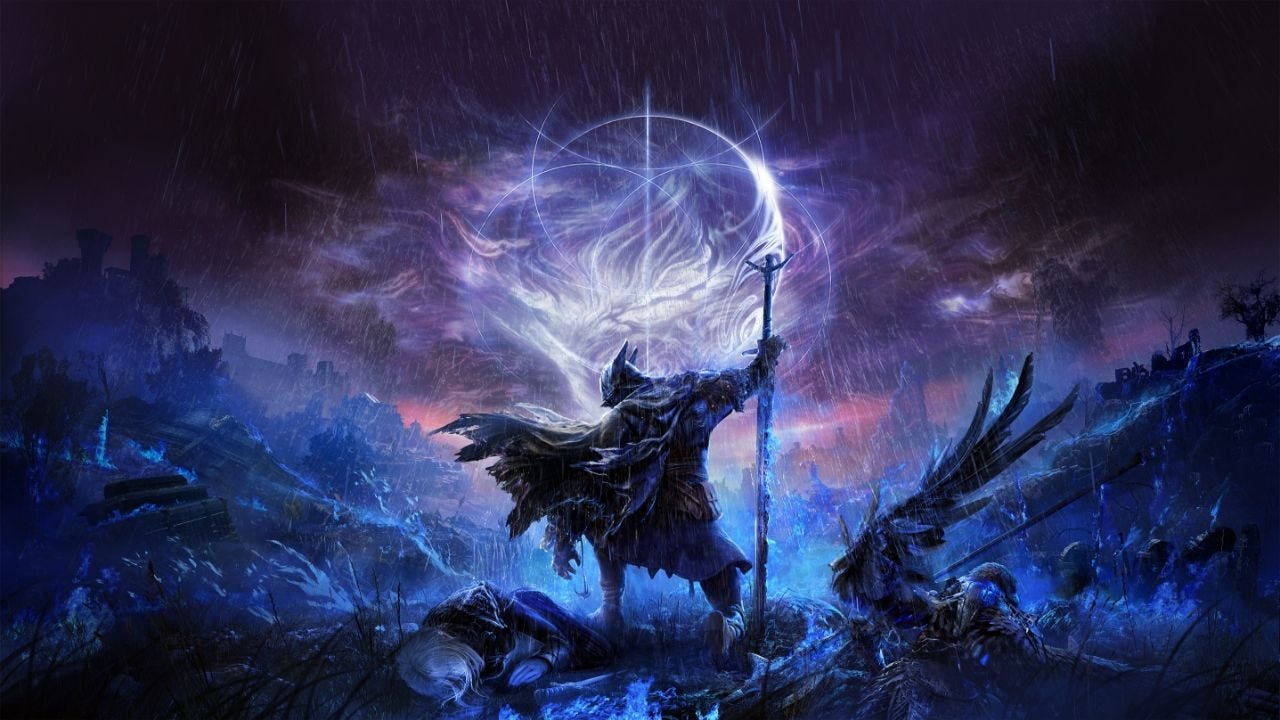Listen now on Apple, Spotify or YouTube
In This Edition
Bandai Namco’s Nao Udagawa on…
- Elden Ring success
- Internal vs third-party IP
- The rise of Japan
Last month I attended the Evo fighting game tournament in France to meet with some of the leaders at Bandai Namco. This included the CEO and president of Bandai Namco Entertainment Nao Udagawa.
Udagawa-san has been part of the Bandai Namco organisation for over 30 years in a variety of different roles. She handled mobile games long before it was the huge industry it is today, and most recently led Bandai Spirits, which develops models, collectibles and toys. She’s not done many interviews, and not on camera, so it was a rare privilege to speak with her about the company’s games strategy.
And during our chat it became clear that for all the complexity of the Bandai Namco organisation, its strategy is deceptively simple.
“Our goal is to keep creating what the customers are looking for, and something that keeps them happy,” she told The Game Business.
Bandai Namco has had some recent success in this area, headline by a certain Elden Ring. In July, it was announced that the original Elden Ring (released in 2022) had surpassed 30 million sales, the 2024 expansion Shadow of the Erdtree had sold ten million, while this year’s multiplayer spin-off Elden Ring: Nightreign has sold five million.
“In terms of sales figures, we have recorded the best ever in Bandai Namco history [for Elden Ring], and that in itself is an achievement,” Udagawa-san said. “But not only that, with the Elden Ring brand we have released various different games, and that shows that we’ve managed to really capture fans in this world that we have created.”
By ‘we’ Udagawa-san means Bandai Namco and Elden Ring developer FromSoftware. FromSoftware is a highly regarded independent studio that can pretty much work with anyone, and indeed it has. Over the last ten years, the firm has partnered with Sony on the 2015 game Bloodborne, Activision on the 2019 hit Sekiro: Shadows Die Twice, and it’s working with Nintendo on the upcoming The Duskbloods.
Yet when it comes to its two biggest franchises, Dark Souls and Elden Ring, the developer repeatedly turned to Bandai Namco.
It’s a relationship that stretches back to 2009 when Bandai Namco secured the rights to publish Demon’s Souls in Europe. But considering the fact that FromSoftware could have its pick of publishers, what makes it turn to Bandai Namco? Udagawa-san’s answer was characteristically simple.
“The length of our successful collaborations has really been the key,” she said. “What both companies have mutually is an aim to exceed fans expectations always. FromSoftware works extremely hard on development, and we do our best in terms of global marketing. I think both sides’ really hard work and dedication have managed to capture and bring out the best [in each other], and that seems to work out well for the fans, too.”
Elden Ring isn’t the only recent hit for Bandai Namco. The company has also seen strong sales when it comes to the Dragon Ball games. Last year’s Dragon Ball: Sparking! Zero broke franchise records in the US, and is now the third best-selling Bandai Namco game in US chart history (behind Dark Souls 3 and Elden Ring). As of earlier this year, it has sold five million units globally.
Both games were developed in Japan and have seen incredible success in the West. This isn’t just a Bandai Namco trend, with the likes of Sega and Capcom also seeing strong sales and impressive review scores for its typically Japan-centric titles in international markets.
“It is wonderful to hear,” Udagawa-san responded. “Some of the strength that I can attest to is the attention to detail in Japanese game development, and the representation of the characters.
“At the Tokyo Game Show [in September], it was wonderful to see so many global participants coming. About half of participants were not from Japan. I really hope that more games created in Japan travel to the international markets, which allows us to strengthen our development capabilities as well.”
Internal vs External
The success of Elden Ring and Dragon Ball is certainly positive, but these are not Bandai Namco IP. The company does own successful franchises, including Gundam, Tekken, Pac-Man and Little Nightmares, but its current big hits are coming from third-party partners. And this is something that Udagawa-san and the wider organisation is conscious of.
“We are focused on both third-party IPs as well as our own brand IPs,” she insisted. “Going forward we would like to really expand on our internal capabilities, and develop games internally based on our own IPs.”
This will include AAA projects, but the firm is making games “of various scales”, and is looking to establish a diverse portfolio. That includes older franchises, too.
“We call them legendary IPs,” Udagawa-san explained. “Most of them are extremely unique in their characteristics. They are gems of IPs, so we are [regularly] approached by partner companies in the view of collaborations. We are trying to rebuild those legendary IPs, and explore new pathways to collaborate with potential partners.”
So are we talking remasters? Remakes? Merchandise? Movies? “Many different ways,” Udagawa-san replied with a laugh.
“Going forward we would like to really expand on our internal capabilities, and develop games internally based on our own IPs.”
Bandai Namco certainly has options with both its current and legacy IP. The wider organisation can develop the games, publish them, make the toys, produce the movies, even create things in the live space. What’s more, when it comes to expanding or establishing IP, the firm thinks about all of these different avenues simultaneously.
“At Bandai Namco, IP content as our focus is the core of our principles,” Udagawa-san explained. “All of our employees’ focus is on how to really capture the worlds created in those IPs, and let them develop into different products and mediums. That is something we think about a lot. Not just limited to one medium like [film and TV] adaptations, we think about everything as an integrated process. So, as well as film, we think about turning our games into products that can be embedded into customers’ lives. It’s a total integrated approach.”
She pointed to all the Pac-Man toys that filled the room we were sitting in.
“Pac-Man has celebrated its 45th anniversary. He is a well-known character already, but I believe he has even more potential, especially regards the licensing business,” she said.
There’s a lot to Bandai Namco. Udagawa-san repeatedly stated that the company’s strategy is about delivering for the fans, which is not an especially insightful line for readers of The Game Business. But it’s perhaps the only strategy that can universally apply to a business that’s as much about Tekken esports tournaments as it is Pac-Man plush toys.
It’s co-developing games with Nintendo, building successful Gundam mobile titles, publishing indie horror games, launching ambitious AAA RPGs… there’s a lot of disparate projects being worked on and a lot of plates to spin. At the same time, this variety gives the company the flexibility to shift and react should the industry do its thing and change without warning.
“Change is inevitable in any industry, but especially in games,” Udagawa-san concluded. “It’s natural. But I don’t see change as a challenge so much, because the primary focus does not change: We just consider the fans and what it is they’d be pleased to see.”
Join us next week as we speak to the team behind one of Bandai Namco’s most iconic franchises, Tekken.














